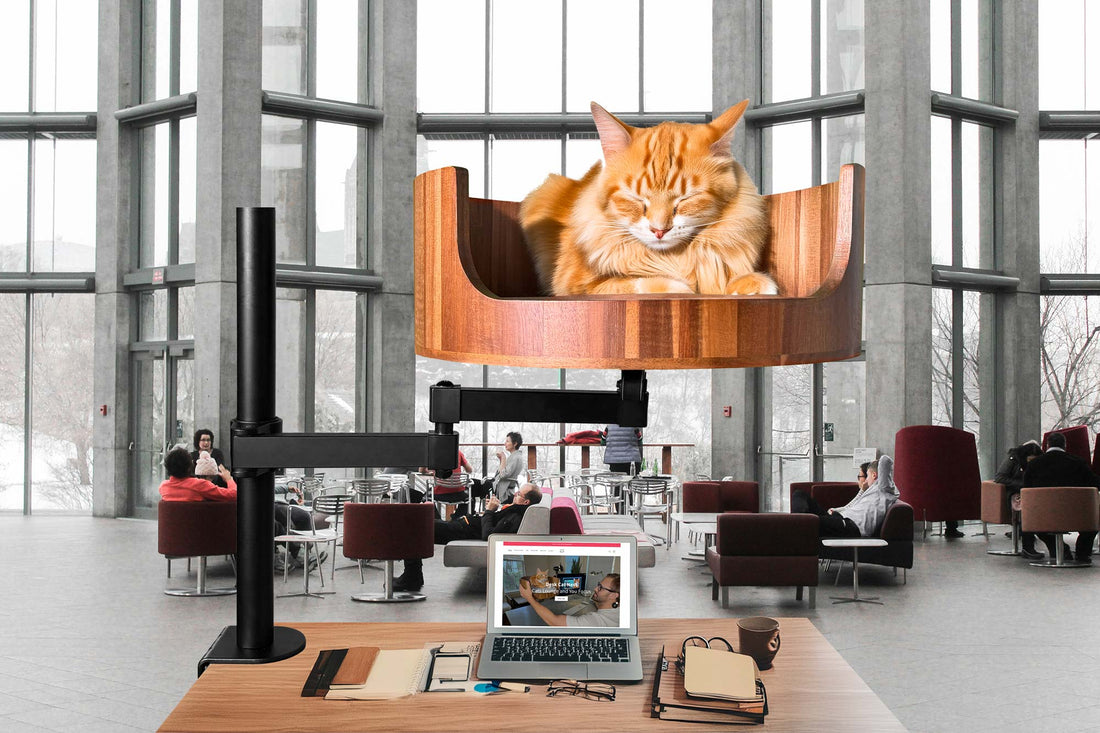
Why Does My Cat Meow So Much at Night? Understanding Behavior
Share
Does your cat keep you up at night with their constant meowing? Understanding why cats exhibit this behavior can help you address the issue and get a good night's sleep. In this article, we will delve into the reasons behind cats meowing at night, offering insights into their behavior and how you can effectively manage it.
Desk Cat Nest is a platform dedicated to providing cat owners with valuable insights into their feline companions' behavior. Through a combination of research and expert advice, we aim to help you better understand your cat's needs and behaviors. In this article, we will explore the various reasons why cats may meow excessively at night, including separation anxiety, hunger, illness, and seeking attention. By gaining a deeper understanding of why your cat exhibits this behavior, you can implement strategies to help them feel more secure and content, leading to a peaceful night's sleep for both you and your feline friend.
1. Cats are naturally more active at night due to their hunting instincts, which can lead to increased meowing.
2. Lack of mental and physical stimulation during the day can contribute to nighttime meowing behavior in cats.
3. Health issues such as hyperthyroidism or cognitive dysfunction may also cause increased vocalization in cats.
4. Providing interactive toys, feeding puzzles, and a comfortable sleeping area can help reduce nighttime meowing.
5. Consulting with a veterinarian is essential to rule out any underlying medical conditions causing excessive meowing in cats.
Reasons for Excessive Meowing
One common reason why cats meow excessively at night is due to loneliness or boredom. Cats are naturally more active during nighttime and may meow to seek companionship or attention. Medical issues such as hyperthyroidism or cognitive dysfunction may also cause a cat to meow more frequently, especially at night. It is important to rule out any underlying health problems before addressing behavioral issues.
Environmental Factors
The environment in which a cat lives can greatly influence their behavior, including excessive meowing at night. Factors such as changes in routine, diet, or household dynamics can contribute to a cat's nighttime meowing. Providing a comfortable and stimulating environment for your cat, including interactive toys, scratching posts, and perches, can help alleviate nighttime meowing.
Strategies to Reduce Nighttime Meowing
There are several strategies that can be employed to help reduce a cat's excessive meowing at night. Engaging in interactive play sessions with your cat before bedtime can help tire them out and encourage restful sleep. Providing a comfortable and quiet sleeping area for your cat, such as a cozy cat nest placed away from distractions, can also help reduce nighttime meowing.
Case Study: Desk Cat Nest
One effective solution to reduce a cat's nighttime meowing is to provide them with a cozy and secluded sleeping area, such as a Desk Cat Nest. By placing a comfortable cat bed or nest on your desk or a quiet corner of the room, your cat can have a designated space to rest and feel safe. This can help reduce anxiety and stress, leading to less nighttime meowing and more restful sleep for both you and your cat.
FAQs for Desk Cat Nest - Why Does My Cat Meow So Much at Night?
What factors can contribute to my cat meowing excessively at night?
There are several reasons why your cat may be meowing so much at night, including hunger, boredom, lack of exercise, attention-seeking behavior, or potential health issues. Providing a comfortable and safe sleeping space, like a Desk Cat Nest, can help address some of these issues.
How can a Desk Cat Nest help reduce my cat's nighttime meowing?
A Desk Cat Nest provides a cozy and secure space for your cat to rest and sleep peacefully. By encouraging your cat to relax and unwind in their designated area, you may help reduce their nighttime restlessness and meowing.
Will my cat use a Desk Cat Nest if they are used to sleeping in my bed?
It may take some time for your cat to adjust to a new sleeping space, especially if they are used to sharing your bed. However, by placing the Desk Cat Nest in a quiet and comfortable spot, offering familiar bedding or toys, and providing positive reinforcement, your cat may begin to enjoy their new sleeping spot.
Can a Desk Cat Nest help with my cat's separation anxiety and nighttime meowing?
While a Desk Cat Nest may not completely eliminate separation anxiety or nighttime meowing, it can provide a sense of security and comfort for your cat when you are not around. Creating a consistent bedtime routine and incorporating the Desk Cat Nest as part of their nighttime routine may help reduce stress and promote relaxation.
Are there any additional tips for addressing my cat's nighttime meowing?
In addition to providing a Desk Cat Nest, it's essential to ensure your cat has access to fresh water, food, and mental and physical stimulation throughout the day. Regular playtime, interactive toys, and engaging activities can help tire out your cat and reduce excessive meowing at night.
In conclusion, providing your cat with a comfortable and secure sleeping space such as the Desk Cat Bed can greatly reduce their nighttime meowing. The cozy and enclosed design of the bed creates a sense of security for your cat, helping them feel calm and content throughout the night. With the Desk Cat Bed, you can enjoy a peaceful night's sleep knowing that your furry friend is comfortable and content. Say goodbye to sleepless nights and hello to a happy cat with the Desk Cat Bed.



















































